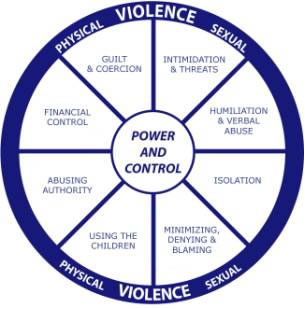Domestic abuse can happen to anyone, yet the problem is often overlooked, excused, or denied. This is especially true when the abuse is psychological, rather than physical. Emotional abuse is often minimized, yet it can leave deep and lasting scars.
Noticing and acknowledging the warning signs and symptoms of domestic abuse is the first step to ending it. No one should live in fear of the person they love. If you recognize yourself or someone you know in the following warning signs and descriptions of abuse, don’t hesitate to reach out. There is help available.
Domestic abuse, occurs when one person in an intimate relationship or marriage tries to dominate and control the other person.
Domestic abuse is used for one purpose and one purpose only: to gain and maintain total control over you. An abuser doesn’t “play fair.” Abusers use fear, guilt, shame, and intimidation to wear you down and keep you under their thumb. Your abuser may also threaten you, hurt you, or hurt those around you.
Domestic abuse does not discriminate. It happens among heterosexual couples and in same-sex partnerships. It occurs within all age ranges, ethnic backgrounds, and economic levels. The bottom line is that abusive behavior is never acceptable, whether it’s coming from a man, a woman, a teenager, or an older adult. You deserve to feel valued, respected, and safe.
Recognizing abuse is the first step to getting help
Domestic abuse often escalates from threats and verbal abuse to violence. And while physical injury may be the most obvious danger, the emotional and psychological consequences of domestic abuse are also severe. Emotionally abusive relationships can destroy your self-worth, lead to anxiety and depression, and make you feel helpless and alone. No one should have to endure this kind of pain— the first step to breaking free is recognizing that your situation is abusive. Once you acknowledge the abusive situation, then you can get the help you need.
Signs of an unhealthy relationship
There are many signs of an unhealthy relationship. The most telling sign is fear of your partner. If you feel like you have to walk on eggshells around your partner—constantly watching what you say and do in order to avoid a blow-up—chances are your relationship is unhealthy. Other signs that you may be in an unhealthy relationship include a partner who belittles you or tries to control you, and feelings of self-loathing, helplessness, and desperation.
To determine whether your relationship is unhealthy, answer the questions below. The more “yes” answers, the more likely it is that you’re in an unhealthy relationship.
| SIGNS THAT YOU’RE IN AN UNHEALTHY RELATIONSHIP | |
| Your Inner Thoughts and Feelings |
Your Partner’s Belittling Behavior |
Do you:
|
Does your partner:
|
| Your Partner’s Violent Behavior or Threats |
Your Partner’s Controlling Behavior |
Does your partner:
|
Does your partner:
|
Physical abuse and domestic abuse
When people talk about domestic abuse, they are often referring to the physical abuse of a spouse or intimate partner. Physical abuse is the use of physical force against someone in a way that injures or endangers that person. Physical assault is a crime, whether it occurs inside or outside of the family. The police have the power and authority to protect you from physical attack.
Sexual abuse is a form of physical abuse
Any situation in which you are forced to participate in unwanted, unsafe, or degrading sexual activity is sexual abuse. Forced sex, even by a spouse or intimate partner with whom you also have consensual sex, is an act of aggression and violence. Furthermore, people whose partners abuse them physically and sexually are at a higher risk of being seriously injured or killed.
It Is Still Abuse If . . .
- The incidents of physical abuse seem minor when compared to those you have read about, seen on television or heard other women talk about. There isn’t a “better” or “worse” form of abuse.
- The incidents of physical abuse have only occurred one or two times in the relationship. If your spouse/partner has injured you once, it is likely they will continue to assault you.
- The physical assaults stopped when you became passive and gave up your right to express yourself as you desire, to move about freely and see others, and to make decisions. It is not okay if you have to give up your rights as a person and a partner in exchange for not being assaulted.
- There has not been any physical violence. Many women are emotionally and verbally abused. This can be as equally frightening and is often more confusing to try to understand.
Emotional abuse: It’s a bigger problem than you think
When people think of domestic abuse, they often picture battered women who have been physically assaulted. But not all unhealthy relationships involve violence. Just because you’re not battered and bruised doesn’t mean you’re not being abused. Many women suffer from emotional abuse, which is no less destructive. Unfortunately, emotional abuse is often minimized or overlooked—even by the person being abused.
Understanding emotional abuse
The aim of emotional abuse is to chip away at your feelings of self-worth and independence. If you’re expereincing emotional abuse, you may feel that there is no way out of the relationship or that without your abusive partner you have nothing.
Emotional abuse includes verbal abuse such as yelling, name-calling, blaming, and shaming. Isolation, intimidation, and controlling behavior also fall under emotional abuse. Additionally, abusers who use emotional or psychological abuse often throw in threats of physical violence or other repercussions if you don’t do what they want.
You may think that physical abuse is far worse than emotional abuse, since physical violence can send you to the hospital and leave you with scars. But, the scars of emotional abuse are very real, and they run deep. In fact, emotional abuse can be just as damaging as physical abuse—sometimes even more so.
Economic or financial abuse: A subtle form of emotional abuse
Remember, an abuser’s goal is to control you, and they will frequently use money to do so. Economic or financial abuse includes:
- Rigidly controlling your finances.
- Withholding money or credit cards.
- Making you account for every penny you spend.
- Withholding basic necessities (food, clothes, medications, shelter).
- Restricting you to an allowance.
- Preventing you from working or choosing your own career.
- Sabotaging your job (making you miss work, calling constantly).
- Stealing from you or taking your money.
Violent and abusive behavior is the abuser’s choice
Despite what many people believe, domestic violence and abuse is not due to the abuser’s loss of control over their behavior. In fact, abusive behavior and violence is a deliberate choice made by the abuser in order to control you.
 Abusers use a variety of tactics to manipulate you and exert their power:
Abusers use a variety of tactics to manipulate you and exert their power:
- Dominance – Abusive individuals need to feel in charge of the relationship. They will make decisions for you and the family, tell you what to do, and expect you to obey without question. Your abuser may treat you like a servant, child, or even as his or her possession.
- Humiliation – An abuser will do everything they can to make you feel bad about yourself or defective in some way. After all, if you believe you’re worthless and that no one else will want you, you’re less likely to leave. Insults, name-calling, shaming, and public put-downs are all weapons of abuse designed to erode your self-esteem and make you feel powerless.
- Isolation – In order to increase your dependence on them, an abusive partner will cut you off from the outside world. They may keep you from seeing family or friends, or even prevent you from going to work or school. You may have to ask permission to do anything, go anywhere, or see anyone.
- Threats – Abusers commonly use threats to keep their partners from leaving or to scare them. Your abuser may threaten to hurt or kill you, your children, other family members, or even pets. They may also threaten to commit suicide, file false charges against you, or report you to social services.
- Intimidation – Your abuser may use a variety of intimidation tactics designed to scare you into submission. Such tactics include making threatening looks or gestures, smashing Such tactics include making threatening looks or gestures, smashing things in front of you, destroying property, hurting your pets, or putting weapons on display. The clear message is that if you don’t obey, there will be violent consequences..
- Denial and blame – Abusers are very good at making excuses for the inexcusable. They will blame their abusive and violent behavior on a bad childhood, a bad day, and even on those they abuse. Your abusive partner may minimize the abuse or deny that it occurred. They will commonly shift the responsibility on to you: Somehow, their violent and abusive behavior is your fault.
Abusers are able to control their behavior—they do it all the time.
- Abusers pick and choose whom to abuse. They don’t insult, threaten, or assault everyone in their life who gives them grief. Usually, they save their abuse for the people closest to them, the ones they claim to love.
- Abusers carefully choose when and where to abuse. They control themselves until no one else is around to see their abusive behavior. They may act like everything is fine in public, but lash out instantly as soon as you’re alone.
- Abusers are able to stop their abusive behavior when it benefits them. Most abusers are not out of control. In fact, they’re able to immediately stop their abusive behavior when it’s to their advantage to do so (for example, when the police show up or their boss calls).
- Violent abusers usually direct their blows where they won’t show. Rather than acting out in a mindless rage, many physically violent abusers carefully aim their kicks and punches where the bruises and marks won’t show.
The cycle of abusers behaviour
Domestic abuse falls into a common pattern:
- Abuse – Your abusive partner lashes out with aggressive, belittling, or violent behavior. The abuse is a power play designed to show you “who is boss.”
- Guilt – After abusing you, your partner feels guilt, but not over what he’s done. He’s more worried about the possibility of being caught and facing consequences for his abusive behavior.
- Excuses – Your abuser rationalizes what they have done. The person may come up with a string of excuses or blame you for the abusive behavior—anything to avoid taking responsibility.
- “Normal” behavior — The abuser does everything they can to regain control and keep their partner in the relationship. They may act as if nothing has happened, or they may turn on the charm. This peaceful honeymoon phase may give their partner hope that the abuser has really changed this time.
- Fantasy and planning – Your abuser begins to fantasize about abusing you again. He spends a lot of time thinking about what you’ve done wrong and how he’ll make you pay. Then he makes a plan for turning the fantasy of abuse into reality.
- Set-up – Your abuser sets you up and puts his plan in motion, creating a situation where he can justify abusing you.
Your abuser’s apologies and loving gestures in between the episodes of abuse can make it difficult to leave. He may make you believe that you are the only person who can help him, that things will be different this time, and that he truly loves you. However, the dangers of staying are very real.




![[ Random Image ]](/wp-content/themes/rosswa/images/random/rosswa-header-image-7.jpg)


